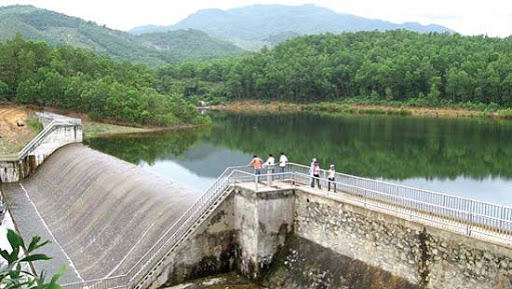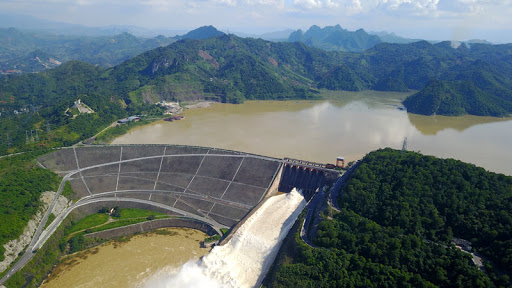May 24, 2025 | 16:23 GMT +7
May 24, 2025 | 16:23 GMT +7
Hotline: 0913.378.918
May 24, 2025 | 16:23 GMT +7
Hotline: 0913.378.918
The Ministry of Agriculture and Rural Development is drafting a Resolution of the National Assembly approving the Project on water resources security and safety for dams and reservoirs for the period 2021-2030, with a vision to 2045.

Vietnam will repair and upgrade water reservoirs.
By 2025, Vietnam will repair and upgrade water reservoirs that are damaged, degraded and lack of anti-flood capacity; to build a number of new large reservoirs to increase storage capacity; to complete the system of works after the exploitation of dam and reservoir that have been approved in the planning.
The rate of using clean and hygienic water in urban residents reaches 95-100%, and 93-95% in rural areas. The rate of collection and treatment of domestic wastewater and urban wastewater meets the standards which is 90%. Centralized wastewater treatment systems meeting environmental standards will built in 92% of industrial zones and export processing zones in operation. The rate of establishments causing serious water pollution will be treated by 100%.
In addition, Vietnam will maintain a stable national forest cover rate of 42-43%, effectively contributing to the implementation of the commitment to reduce greenhouse gas emissions. In order to improve the efficiency of biodiversity conservation and protection capacity of the forest, 10% of natural forest area is upgraded.
By 2030, Vietnam will complete all remaining large reservoirs and the water transfer system, to meet some targets as below:
To link water sources between major river basins to ensure the storage, regulation and balance of on-spot water sources to meet the needs of production, people's livelihood and economic sectors.
Modernize the exploitation management and raise the safety level of dams and large reservoirs meeting the international standards. 100% of the urban population and 70% of the rural population will be supplied with clean water meeting the domestic standards; 30% of the area under rice cultivation will be applied by advanced farming methods.
The Ministry of Agriculture and Rural Development aims to proactively prevent and combat natural disasters, adapt to climate change, and to minimize the loss of life and property from water-related disasters. To perfect and modernize the irrigation system to proactively regulate sufficient water sources for concentrated aquaculture areas and marine economic activities.
100% of forest area with owners as organizations is managed sustainably, 20% of natural forest area is upgraded to improve the efficiency of biodiversity conservation and forest protection capacity; to minimize cases of violating the law on forest protection and development, ensuring environmental security.
By 2045, Vietnam will form a network to link national water sources, and proactivate endogenous water sources and be independent with external water sources. To build and complete major works to regulate salinity and freshness; and to raise water reserves in the river system. Basically, the rural population has access to clean water meeting the standards of domestic water.
70% of rice areas and upland crops are applied to advanced farming methods and technologies. Basically, dams and large reservoirs are modernized. The management and operation are automating. Proactively and promptly respond to all disasters caused by water.

Vietnam will repair and upgrade water reservoirs.
One of the solutions in the draft is to ensure proactive water supply for domestic use. Specifically, to complete the production, supply and consumption of clean water in urban and rural areas; to stabilize the operation of rural clean water centers in the period 2021-2025 for social security.
Reviewing, adjusting and supplementing the domestic water supply in the national planning system, ensuring uniformity and synchronization of infrastructure, creating an interconnection between the rural domestic and urban water supply system. To assess and inventory existing domestic water supply. To form the plan of water use annualy and every 5-year to ensure local water balance, to link water sources according to season, locality and basin.
Replace the stable source of raw water supplied for daily life from reservoirs, dams and irrigation works step by step. To add solutions to create water sources in place to serve domestic water supply in case of water problems.
Make a list of water sources, set up a corridor to protect water sources for daily life. To strengthen inspection, examination, irregularity, supervision and strictly handle violations, destroying water sources, and safety of domestic water supply systems. To set up an online monitoring system for water quantity and quality of domestic water supply works. To share water supply datas between central, local agencies and businesses.
Concentrate medium-term capital sources to invest in clean water supply works connecting provinces, inter-regions, water supply works for areas frequently affected by natural disasters and water problems, for mountainous areas, islands, and lowland areas. To upgrade, repair and build new rural domestic water supply works.
Credit incentives for implementation of the National Strategy on rural water supply and sanitation, to open up capital sources to support businesses. To encourage and mobilize capital for socialization and public-private cooperation to invest in; to manage and operate domestic water supply works, especially in rural areas.
Review and adjust the water tariff to ensure the correct collection of costs for the management and operation of domestic water supply works. To subsidize water prices by regulations as well as the regulation on ceiling prices for domestic water in association with reasonable price compensation for poor households, low-income households, border areas and islands.
To research and apply brackish and salinity treatment technology; to propose mechanisms and policies to support this application of treatment technologies in densely populated islands, the Mekong River Delta and coastal areas.
Call international organizations to support concessional loans to invest, upgrade, repair, manage and operate water supply works, ensuring sustainability. To strengthen communication and education activities; to raise community awareness about challenges and threats in the water supply sector, plots and activities to sabotage water sources and safety of clean water supply systems.
Translated by Ha Phuc

(VAN) The mutual export of agrifood products between the European Union (EU) and the United Kingdom (UK) must occur again without certification, border controls or other red tape. This was agreed at the UK-EU summit.
/2025/05/22/5121-2-173645_677.jpg)
(VAN) NBSAP Tracker identifies strengths and areas for improvement in the National Biodiversity Strategy, based on each region’s priorities and capacities.

(VAN) The draft amendment to the Circular on rice export trading stipulates a periodic reporting regime for rice exporting enterprises.

(VAN) Dong Thap farmers attained an average profit margin of 64% during the summer-autumn 2024 crop (first season), while An Giang and Kien Giang farmers followed with 56% and 54%, respectively.

(VAN) As a doctoral student doing research on renewable energy and electrification at Harvard University, the author shares his musings on electricity, nature, and countryside memories.

(VAN) The decree on Extended Producer Responsibility (EPR) ensures transparent management and disbursement of support funds, avoiding the creation of a “give-and-take” mechanism.

(VAN) Hue City rigorously enforces regulations regarding marine fishing and resource exploitation, with a particular emphasis on the monitoring of fishing vessels to prevent illegal, unreported, and unregulated (IUU) fishing.